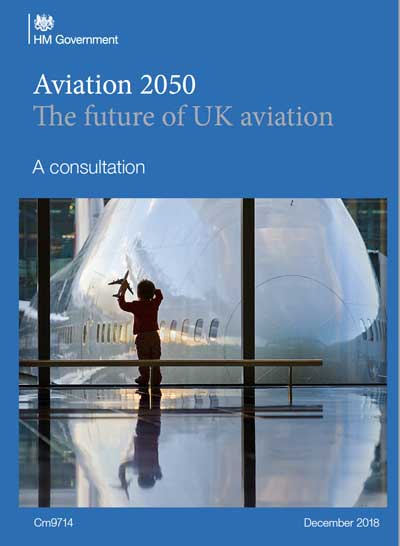
Click here to access the full Aviation 2050 Green Paper.
The UK Government has published its Aviation Strategy Green Paper – a long-term plan for sustainable growth to ensure the industry’s continued success.
The draft strategy, open for public consultation for 16 weeks, proposes new measures to ensure the UK’s aviation sector continues to bring significant benefits to the UK economy and citizens up to 2050 and beyond, including a new passenger charter, practical requirements to reduce emission and noise levels and more use of innovative technology.
The consultation also sets out how the government plans to modernise airspace, ensuring journeys are quicker, cleaner and more efficient in the future, reducing congestion, noise and emissions and helping avoid future delays.
“Today we have the largest aviation network in Europe and the third largest in the world, an industry that contributes at least £22 billion to the UK economy, along with over 230,000 jobs,” says Aviation Minister Baroness Sugg. “The industry is also growing at a rapid rate to meet rising demand. Passenger numbers have been increasing for seven consecutive years, and it’s estimated that UK passenger traffic could soar from 284 million last year to 435 million by 2050. Our ambition is to expand our international connections, boost trade and investment and strengthening domestic links to support businesses and travelling passengers.”
She added: “By working with the industry we will drive sustainable growth, ensuring the next generation will continue to benefit from the growing number of opportunities this exciting and innovative sector offers.”
Proposals to support aviation growth in the consultation include:
- Setting out a framework for future sustainable growth
- Commitments to signing further liberal air service agreements with countries around the world to boost trade and tourism
- Measures to encourage greater competition and more choice for passengers
- Modernised UK airspace to improve efficiency and reduce delays
Building on the positive steps already taken by the industry in balancing further growth with action to address environmental and community impacts, the document outlines new practical requirements to reduce emissions and noise levels for local communities alongside tougher enforcement measures. It includes plans to embed noise exposure levels into the planning approval process, the introduction of noise caps which will be regularly reviewed and enforced, along with the appointment of a Chair of the new Independent commission on civil aviation noise.
Tackling climate change will be a key requirement of future growth, with a proposal for negotiating a long-term global emissions target for international aviation to incentivise industry to adopt cleaner technologies. Plans include that applications for growth must also demonstrate they will not prevent the UK’s ability to meet its Climate Change Act 2008 targets.
Tim Alderslade, Chief Executive of Airlines UK, said: “We welcome the next stage in the government’s aviation strategy. Airlines look forward to continuing to work with Ministers to create a strategy that helps to deliver sustainable growth in our sector. To connect UK families and businesses domestically and to the world, deliver value for money, and further improve the travelling experience for all passengers.”
The consultation follows various development projects taking place across the country including a new terminal building at Luton Airport, the launch of new flights between Manchester and Mumbai, and Birmingham Airport’s announcement of a £500 million expansion plan to boost capacity and improve facilities.
Responding to the publication of the Aviation Strategy Green Paper, Manchester Airports Group (MAG), commented: “We know that the UK’s aviation sector will underpin the Government’s aspirations for a global and balanced Britain, and the Aviation Strategy provides important recognition of the industry’s potential to contribute to continued economic growth and prosperity.
“Manchester Airport and MAG as an airport group are fully committed to reducing its environmental impact and is working hard to drive economic growth and employment opportunities for local communities. Initiatives like our on-site Airport Academy will leave a positive legacy of skills and education felt well beyond the airport.
“When this strategy is finalised, it will need to enable growth in both the short and the long term, and make all parts of the UK amongst the most competitive places in the world to start new routes. It is important the consultation process is now used to identify the specific policies and other measures that will do most to deliver that goal.
“For example, as we invest more than £1bn in our airport over the coming years, we want to work with Government to maximise the benefits of direct connectivity in the North. Airports like Manchester are strategic national assets, connecting people and goods to the world.”
The consultation also follows parliamentary approval for a new runway at Heathrow earlier this year, which will provide new routes and support businesses across the country, supplemented by a world class package of compensation and mitigation measures for local communities.
John Holland-Kaye, CEO Heathrwo Airport, commented: “We welcome the Government’s Aviation Strategy – and its recognition of the central role our industry plays in the UK’s economic prosperity.
“We are constantly working to improve the way we operate for the benefit of passengers, airlines, and for our local residents, and we agree it is right that the Strategy focuses on sustainability, competition and choice, and passenger experience.
“We are also pleased to see the detail of the Government’s final plans for airspace modernisation, which will equip industry with the tools to be more resilient, deliver more reliable service, and to reduce its environmental impact.”
The strategy will, however, seek to further maximise benefits to regional growth and connectivity by encouraging efficient use of infrastructure beyond Heathrow, delivering greater capacity at UK airports and driving competition between airlines to deliver better value for money for customers.
A final white paper version of the aviation strategy will be published by the middle of 2019.







